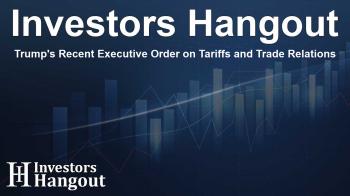Trump's Recent Executive Order on Tariffs and Trade Relations

Trump Extends Tariff Suspension on China
Recently, President Donald Trump took significant steps concerning trade relations by signing an executive order that extends the suspension of heightened tariffs on China for an additional 90 days. This executive decision ensures that the existing 10% reciprocal tariff remains in effect, providing a buffer for ongoing negotiations related to trade practices.
Facilitating Ongoing Negotiations
This executive order is considered essential in facilitating productive discussions between the U.S. and China. The goal is to rectify trade imbalances and address unfair practices that have been a source of contention between the two nations. The administration has emphasized the need for constructive dialogue, highlighting the ongoing efforts to establish fair and balanced trade relations.
Productive Discussions and Trade Talks
The U.S. and China have been involved in multiple rounds of negotiations aimed at enhancing trade reciprocity and addressing key national security concerns. These discussions have been characterized as constructive, building toward a mutual understanding that benefits both countries. President Trump has been optimistic about the progress, stating, "We're getting along with China very well." This sentiment reflects the administration's hope for better economic relations.
Key Figures Influence Trade Decisions
Treasury Secretary Scott Bessent mentioned recently that President Trump holds the final authority regarding trade deals, including any potential extensions of tariff pauses. This indicates the administration's centralized approach to trade negotiations and policy-making.
Impact of Tariff Extensions
This extension of tariffs serves as a critical relief measure for both sides. Analysts note that China risks losing a staggering $488 billion in exports to the U.S. Without a proper trade deal, the U.S. market would also face losses amounting to around $100 billion in exports to China. Thus, both parties have a vested interest in reaching a comprehensive agreement that could stabilize economic relations.
Frequently Asked Questions
What does the executive order entail?
The executive order extends the suspension of heightened tariffs on China for an additional 90 days, keeping the current 10% tariff in place.
Why is the U.S. focusing on China concerning tariffs?
The U.S. aims to rectify trade imbalances and address unfair trade practices, which have been longstanding issues between the two nations.
How does this extension affect negotiations?
This extension is intended to facilitate ongoing negotiations, allowing both countries to work towards a balanced trade agreement without the pressure of additional tariffs.
What has President Trump said about trade relations with China?
Trump has expressed optimism about the state of U.S.-China relations, stating that "we're getting along with China very well," reflecting hope for constructive dialogues.
What are the economic implications of these tariff policies?
The suspension of heightened tariffs is crucial for both economies as it prevents significant losses in exports for both countries and fosters a more stable trading environment.
About The Author
Contact Logan Wright privately here. Or send an email with ATTN: Logan Wright as the subject to contact@investorshangout.com.
About Investors Hangout
Investors Hangout is a leading online stock forum for financial discussion and learning, offering a wide range of free tools and resources. It draws in traders of all levels, who exchange market knowledge, investigate trading tactics, and keep an eye on industry developments in real time. Featuring financial articles, stock message boards, quotes, charts, company profiles, and live news updates. Through cooperative learning and a wealth of informational resources, it helps users from novices creating their first portfolios to experts honing their techniques. Join Investors Hangout today: https://investorshangout.com/
The content of this article is based on factual, publicly available information and does not represent legal, financial, or investment advice. Investors Hangout does not offer financial advice, and the author is not a licensed financial advisor. Consult a qualified advisor before making any financial or investment decisions based on this article. This article should not be considered advice to purchase, sell, or hold any securities or other investments. If any of the material provided here is inaccurate, please contact us for corrections.

